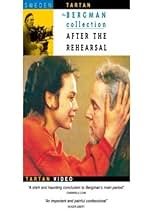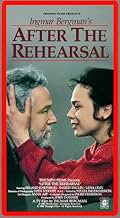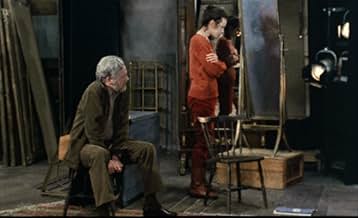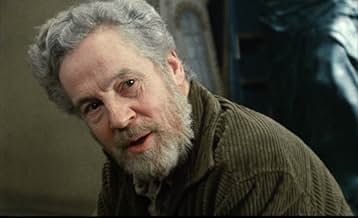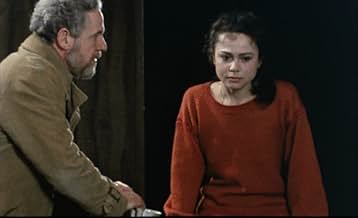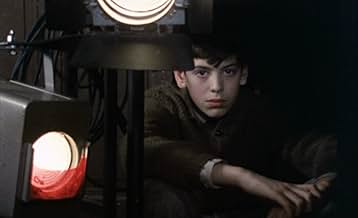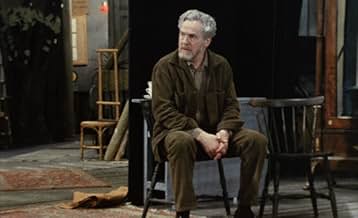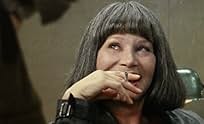IMDb रेटिंग
7.1/10
3.1 हज़ार
आपकी रेटिंग
अपनी भाषा में प्लॉट जोड़ेंAs an aging playwright interacts with the young lead in his play after everybody's gone home, he reminisces about her mother, whom he maintained a sexual relationship with before she died.As an aging playwright interacts with the young lead in his play after everybody's gone home, he reminisces about her mother, whom he maintained a sexual relationship with before she died.As an aging playwright interacts with the young lead in his play after everybody's gone home, he reminisces about her mother, whom he maintained a sexual relationship with before she died.
- पुरस्कार
- 2 कुल नामांकन
फ़ीचर्ड समीक्षाएं
10agboone7
I've always said that I could never choose a favorite filmmaker, but that if I had to, it would be Ingmar Bergman, for certain. A bit of a contradiction, I admit, but there you have it. For me, he is the grandmaster of the cinema. I've seen exactly forty of his films, and "After the Rehearsal" may be the greatest of them all.
Of course, that depends very much on your tastes. We see here a very different Bergman from the one many viewers are accustomed to. There are, after all, two Ingmar Bergmans: First, we have Bergman the magician, the cinematic sorcerer who made films like "The Seventh Seal" and "Persona". Secondly, we have Bergman the realist, emerging during the latter period of his career, with films like "Scenes From a Marriage" and "Autumn Sonata". These films aren't quite realism, of course — they're still very formal — but they're certainly very stripped-down and minimalistic by comparison.
"After the Rehearsal" is probably the most extreme example of this latter category of Bergman's cinema. It is a minimalist exercise in what is essentially filmed theater. As a result, those looking for the kind of cinematic wizardry that Bergman displayed in so many of his films up through the '60s (and which he revived for "Fanny and Alexander" in 1982) may be a bit disappointed by this film, strictly in aesthetic and stylistic terms. Nyqvist's cinematography is absolutely masterful, as always, but it's masterful in the same way it was in "Scenes From a Marriage" — unrelenting close-ups of the frail human condition, et cetera — versus the kind of technical and formal mastery he displayed in "Fanny and Alexander" or Tarkovsky's "The Sacrifice". This is a low-budget, theatrical production, so don't expect a grand tour de force of Bergmanian cinema.
On the other hand, when it comes to content, that's exactly what "After the Rehearsal" is. It offers the most insightful, profound exposition yet of Bergman's identity, essence, and point of view as an artist, as a filmmaker (and as a theater director), and perhaps most notably, as a human being. Every line, every word, every expression, every intonation, every gesture is a revelation of the most meaningful variety, for those who are familiar with Bergman and his way of expressing ideas. Never before has Bergman condensed so much thought, so many ideas and themes, into one film (and quite a short one at that). This is a concentrated exercise in subtextual expression, and on that note, I have two caveats to issue to those considering watching this film.
First, as we know, most audiences today don't like to be provoked toward thought, analysis, or self-reflection, so if you're turned off by the idea of watching two people talk for seventy minutes straight, save yourself the effort and skip this one. "After the Rehearsal", even more than normal for a Bergman film, requires the ability to think in thematic, subtextual, and metaphorical terms. Even for the most avid Bergman fans, and even by the strictest Bergman standards, this film requires patience and thorough analysis.
Secondly, I'm a firm believer in experiencing a filmmaker's body of work chronologically. I know many viewers don't share this compulsion, but I must stress that it is crucial for this film. "After the Rehearsal" is a deep and painstaking reflection on everything Bergman has ever done and everything he has ever been during the course of his long and illustrious career. If you haven't seen the vast majority of Bergman's previous work, this film will be impossible to fully appreciate.
Virtually all of Bergman's recurring themes are present in "After the Rehearsal", such as the idea of human beings as actors in this often shoddy, second-rate production that we call life. Bergman's characters engage in emotional dialogue or intensive introspection, and then, hearing the words come out of their mouths, they experience shame and mortification as a result of what they perceive to be their own playacting and histrionics, and so they subsequently backpedal over their previous statements with a tone of fatigue and despair. It's not just Bergman's characters, however, that exhibit this behavior. Bergman himself does it, from film to film. The first time we saw it was in "Prison" (1949), his sixth film, when he criticized himself in a moment of self-reference that cited a scene from "It Rains on Our Love" (I believe). Since then, and especially in his later work, it's been a constant for Bergman, although much more subtle and less explicit than it was in "Prison". In a way, it provides a metaphor for what Bergman does with "After the Rehearsal".
"Fanny and Alexander" is considered Bergman's swan song, and I suppose it is. He officially retired from cinema afterwards, and everything he directed since then, with the exception of "The Making of Fanny and Alexander", was a television film, including "After the Rehearsal", in which Bergman makes one last attempt to clarify himself, to backpedal on a career of directing films and plays, and to explain what it all meant, and what he has become in light of it.
"After the Rehearsal" is a highly self-reflexive, metatextual meditation on what it means to be a director. The power, the manipulation, the messy emotions and relationships with actors who often confuse the role they play in a film (or play) with the role they play in life. The two roles begin to converge, and at the helm of it all, there is Bergman, a man who is slowly but surely distancing himself from the world around him. The world of cinema. The world of theater. The world of life.
Ultimately, that's what "After the Rehearsal" is about. It's Bergman's explanation and exploration of the reasons why he has chosen to distance himself from the world of filmmaking, and it's brilliant for every moment of its 72 minutes.
RATING: 9.67 out of 10 stars
Of course, that depends very much on your tastes. We see here a very different Bergman from the one many viewers are accustomed to. There are, after all, two Ingmar Bergmans: First, we have Bergman the magician, the cinematic sorcerer who made films like "The Seventh Seal" and "Persona". Secondly, we have Bergman the realist, emerging during the latter period of his career, with films like "Scenes From a Marriage" and "Autumn Sonata". These films aren't quite realism, of course — they're still very formal — but they're certainly very stripped-down and minimalistic by comparison.
"After the Rehearsal" is probably the most extreme example of this latter category of Bergman's cinema. It is a minimalist exercise in what is essentially filmed theater. As a result, those looking for the kind of cinematic wizardry that Bergman displayed in so many of his films up through the '60s (and which he revived for "Fanny and Alexander" in 1982) may be a bit disappointed by this film, strictly in aesthetic and stylistic terms. Nyqvist's cinematography is absolutely masterful, as always, but it's masterful in the same way it was in "Scenes From a Marriage" — unrelenting close-ups of the frail human condition, et cetera — versus the kind of technical and formal mastery he displayed in "Fanny and Alexander" or Tarkovsky's "The Sacrifice". This is a low-budget, theatrical production, so don't expect a grand tour de force of Bergmanian cinema.
On the other hand, when it comes to content, that's exactly what "After the Rehearsal" is. It offers the most insightful, profound exposition yet of Bergman's identity, essence, and point of view as an artist, as a filmmaker (and as a theater director), and perhaps most notably, as a human being. Every line, every word, every expression, every intonation, every gesture is a revelation of the most meaningful variety, for those who are familiar with Bergman and his way of expressing ideas. Never before has Bergman condensed so much thought, so many ideas and themes, into one film (and quite a short one at that). This is a concentrated exercise in subtextual expression, and on that note, I have two caveats to issue to those considering watching this film.
First, as we know, most audiences today don't like to be provoked toward thought, analysis, or self-reflection, so if you're turned off by the idea of watching two people talk for seventy minutes straight, save yourself the effort and skip this one. "After the Rehearsal", even more than normal for a Bergman film, requires the ability to think in thematic, subtextual, and metaphorical terms. Even for the most avid Bergman fans, and even by the strictest Bergman standards, this film requires patience and thorough analysis.
Secondly, I'm a firm believer in experiencing a filmmaker's body of work chronologically. I know many viewers don't share this compulsion, but I must stress that it is crucial for this film. "After the Rehearsal" is a deep and painstaking reflection on everything Bergman has ever done and everything he has ever been during the course of his long and illustrious career. If you haven't seen the vast majority of Bergman's previous work, this film will be impossible to fully appreciate.
Virtually all of Bergman's recurring themes are present in "After the Rehearsal", such as the idea of human beings as actors in this often shoddy, second-rate production that we call life. Bergman's characters engage in emotional dialogue or intensive introspection, and then, hearing the words come out of their mouths, they experience shame and mortification as a result of what they perceive to be their own playacting and histrionics, and so they subsequently backpedal over their previous statements with a tone of fatigue and despair. It's not just Bergman's characters, however, that exhibit this behavior. Bergman himself does it, from film to film. The first time we saw it was in "Prison" (1949), his sixth film, when he criticized himself in a moment of self-reference that cited a scene from "It Rains on Our Love" (I believe). Since then, and especially in his later work, it's been a constant for Bergman, although much more subtle and less explicit than it was in "Prison". In a way, it provides a metaphor for what Bergman does with "After the Rehearsal".
"Fanny and Alexander" is considered Bergman's swan song, and I suppose it is. He officially retired from cinema afterwards, and everything he directed since then, with the exception of "The Making of Fanny and Alexander", was a television film, including "After the Rehearsal", in which Bergman makes one last attempt to clarify himself, to backpedal on a career of directing films and plays, and to explain what it all meant, and what he has become in light of it.
"After the Rehearsal" is a highly self-reflexive, metatextual meditation on what it means to be a director. The power, the manipulation, the messy emotions and relationships with actors who often confuse the role they play in a film (or play) with the role they play in life. The two roles begin to converge, and at the helm of it all, there is Bergman, a man who is slowly but surely distancing himself from the world around him. The world of cinema. The world of theater. The world of life.
Ultimately, that's what "After the Rehearsal" is about. It's Bergman's explanation and exploration of the reasons why he has chosen to distance himself from the world of filmmaking, and it's brilliant for every moment of its 72 minutes.
RATING: 9.67 out of 10 stars
Fanny and Alexander, to Ingmar Bergman, IS his last released film, written and directed by him. But this film, which was originally meant only for Swedish television, found its way to the USA and abroad, and (excluding Saraband, which was a film that just had to be made by its maker) is a welcome piece of theater, about the theater. After the Rehearsal is a short, but extremely satisfying take on what it means to be a director, and what it means to act, or to just be in the profession of the imitation of life. Bergman gives us only three actors (two kids, who pop up only for a few moments, one of which the child who wonderfully played Alexander in the above title, is one of them), and all that happens is talk, and talk.
To one who may not be familiar well with Bergman, it may not be wise to go immediately to this film. That is, unless one is very much in love with the theater. The filmmaker, who was also a major producer and director of countless theatrical production, is able to suffuse his personal views, good and bad, on the process, or the lack thereof. Interesting too is how his lead male, Henrik (Erland Josephsson, one of Bergman's most recognizable and accessible talents), has a conversation not just with an aspiring actress (Lena Olin), but also his ex-wife (Ingrid Thulin, also one of the magnificent women from Bergman's repertory company), to explore his past and present difficulties.
There is so much that Bergman brings to the table to discuss about the theater in this film, and in such a short running time, that it might be moot to delve very far into his what certain things may or may not 'mean'. Like many of the director's films, it's dramatic structure that tries to get behind the surfaces of what lies in seemingly one or two-sided characters. Henrik, at times, is given voice-over narration where he questions what he's saying, sometimes in anger or despair, to this young actress. Or, when his love (Thulin) is shown to be somewhat compassionate even as she seems a little crazed or, in fact, lonely. As Henrik and his pupil talk (not rehearse, of course) about why they are there, it becomes strikingly existential even when it's not meant to be. Olin is brilliant in the opposing side of Josephsson's often calm but boiling persona, as she tries to figure out what it is this director wants out of her.
When it comes down to it, Bergman is not only asking questions about the theater and the people in it, but also about human nature in its role of the theater. While this could sound like subject matter to scare or (worse) bore away some viewers, if you give the film enough patience for the 72 minutes (that seem to fill each minute with enough substance for an average work twice its length), it serves its purpose well enough to not be disregarded as an important later work in Bergman's career. And, by the way, if you're young (i.e. under 17) and have some reason to want to check this out, don't let the R rating deter you; it's one of the most un-necessarily R-rated films ever (for a brief flash of nudity, which could very well even be given a PG rating). A+
To one who may not be familiar well with Bergman, it may not be wise to go immediately to this film. That is, unless one is very much in love with the theater. The filmmaker, who was also a major producer and director of countless theatrical production, is able to suffuse his personal views, good and bad, on the process, or the lack thereof. Interesting too is how his lead male, Henrik (Erland Josephsson, one of Bergman's most recognizable and accessible talents), has a conversation not just with an aspiring actress (Lena Olin), but also his ex-wife (Ingrid Thulin, also one of the magnificent women from Bergman's repertory company), to explore his past and present difficulties.
There is so much that Bergman brings to the table to discuss about the theater in this film, and in such a short running time, that it might be moot to delve very far into his what certain things may or may not 'mean'. Like many of the director's films, it's dramatic structure that tries to get behind the surfaces of what lies in seemingly one or two-sided characters. Henrik, at times, is given voice-over narration where he questions what he's saying, sometimes in anger or despair, to this young actress. Or, when his love (Thulin) is shown to be somewhat compassionate even as she seems a little crazed or, in fact, lonely. As Henrik and his pupil talk (not rehearse, of course) about why they are there, it becomes strikingly existential even when it's not meant to be. Olin is brilliant in the opposing side of Josephsson's often calm but boiling persona, as she tries to figure out what it is this director wants out of her.
When it comes down to it, Bergman is not only asking questions about the theater and the people in it, but also about human nature in its role of the theater. While this could sound like subject matter to scare or (worse) bore away some viewers, if you give the film enough patience for the 72 minutes (that seem to fill each minute with enough substance for an average work twice its length), it serves its purpose well enough to not be disregarded as an important later work in Bergman's career. And, by the way, if you're young (i.e. under 17) and have some reason to want to check this out, don't let the R rating deter you; it's one of the most un-necessarily R-rated films ever (for a brief flash of nudity, which could very well even be given a PG rating). A+
"After the Rehearsal was meant to be a pleasant little episode on my road toward death. ... (It) had a lot to do with my attitude and my relationship with the theater and the actors, with this dirty, dubious, fantastic, incredible, and cruel profession. That's all." -- Ingmar Bergman
Ingmar Bergman, age 66 and a couple years after his final feature film, Fanny and Alexander, was active in theater work and had a few TV movies left in him, of which this film is one. It takes place on a single set, a stage, has just three characters, and has the feeling of a simple play itself. It starts slowly but bear with it, it's only 73 minutes and finishes well.
Erland Josephson plays a theater director (without a doubt Bergman himself), who is musing in the empty theater after a rehearsal one day. His leading lady (Lena Olin) shows up on the pretext of looking for her bracelet; she's young enough to be his daughter, but has an interest in him. The two talk about their craft but also their personal lives, and as we come to understand that her mother worked with and loved him, she's conjured up in his imagination (Ingrid Thulin). It was a treat to see all three of these actors but maybe Thulin most of all, who at 58 has her character voice the sadness of aging, echoing the theater director in the present, even though she's still quite beautiful.
While it seemed a little bit vain of Bergman to have both the older and younger woman want him, er, the director sexually, the conversations build in momentum until with Olin he imagines the course their relationship would take if they gave in to their desire. It feels autobiographical and honest, helping to make up for a work that otherwise feels rather staid and erudite. While the film doesn't live up to its full potential, it's worth watching, especially if you're a Bergman fan.
Some quotes: "At my age, sometimes when you lean forward, your head suddenly finds itself in another reality. The dead are no longer dead. The living appear like ghosts. What was obvious a minute earlier becomes peculiar and hard to grasp."
"I'll tell you the pure and simple truth: I love actors. I love them as phenomena. I love their profession. I love their courage, or their contempt for death, whatever you want to call it. I understand their desire to escape, but also their dark, ruthless honesty."
"I hate turmoil, aggression, and outbursts of emotion. I administrate, distribute, and organize. I don't participate in the drama, I give it material form. I hate all things spontaneous, rash, and imprecise. I have no room for my own confusion except as a key to secrets of a script or as a stimulus for the creativity of actors."
"Nurture your childishness. It's a good filter against consciousness."
Ingmar Bergman, age 66 and a couple years after his final feature film, Fanny and Alexander, was active in theater work and had a few TV movies left in him, of which this film is one. It takes place on a single set, a stage, has just three characters, and has the feeling of a simple play itself. It starts slowly but bear with it, it's only 73 minutes and finishes well.
Erland Josephson plays a theater director (without a doubt Bergman himself), who is musing in the empty theater after a rehearsal one day. His leading lady (Lena Olin) shows up on the pretext of looking for her bracelet; she's young enough to be his daughter, but has an interest in him. The two talk about their craft but also their personal lives, and as we come to understand that her mother worked with and loved him, she's conjured up in his imagination (Ingrid Thulin). It was a treat to see all three of these actors but maybe Thulin most of all, who at 58 has her character voice the sadness of aging, echoing the theater director in the present, even though she's still quite beautiful.
While it seemed a little bit vain of Bergman to have both the older and younger woman want him, er, the director sexually, the conversations build in momentum until with Olin he imagines the course their relationship would take if they gave in to their desire. It feels autobiographical and honest, helping to make up for a work that otherwise feels rather staid and erudite. While the film doesn't live up to its full potential, it's worth watching, especially if you're a Bergman fan.
Some quotes: "At my age, sometimes when you lean forward, your head suddenly finds itself in another reality. The dead are no longer dead. The living appear like ghosts. What was obvious a minute earlier becomes peculiar and hard to grasp."
"I'll tell you the pure and simple truth: I love actors. I love them as phenomena. I love their profession. I love their courage, or their contempt for death, whatever you want to call it. I understand their desire to escape, but also their dark, ruthless honesty."
"I hate turmoil, aggression, and outbursts of emotion. I administrate, distribute, and organize. I don't participate in the drama, I give it material form. I hate all things spontaneous, rash, and imprecise. I have no room for my own confusion except as a key to secrets of a script or as a stimulus for the creativity of actors."
"Nurture your childishness. It's a good filter against consciousness."
This is a brilliant work of art - it manages to be both an outstanding piece of theatre captured on film and an equally engaging film about theatre. There is no plot in a conventional sense, and absolutely no action. Instead, Erland Josephson, utterly convincing in his role as an aging theatre director, quietly and with ruthless honesty interacts with both his current new star and an actress from his personal and professional past. During this interplay, the director on the screen (speaking for the director behind the camera?) explains his love for actors and the theatre, while simultaneously modeling and undermining the sense of alienation that he feels he needs to have in order to get his job done in this world that he loves. At the same time, his young star examines her reasons for acting, and the woman from his past presents yet another take on the function of theatricality.
The dialogue is, as always with Bergman, perfect; the film is saturated with ideas; and the simple stage where every moment of the film takes place works in two directions at once, reminding us that we are watching a performance even while it insists we are also seeing "real" people at work.
Bergman is always amazing in his ability to express, in films that are set in singular specific locations, deep emotions and concepts that are nonetheless universal - in this film he gives us a little bonus, an insight into the motives behind manufacture of representation itself.
The dialogue is, as always with Bergman, perfect; the film is saturated with ideas; and the simple stage where every moment of the film takes place works in two directions at once, reminding us that we are watching a performance even while it insists we are also seeing "real" people at work.
Bergman is always amazing in his ability to express, in films that are set in singular specific locations, deep emotions and concepts that are nonetheless universal - in this film he gives us a little bonus, an insight into the motives behind manufacture of representation itself.
A very theatrical piece (literally), made for Swedish television, this is essentially a 3 character play, all taking place on stage after a rehearsal of Strindberg's 'Dream Play'.
Erland Josephson – wonderful as always – is the most blatant stand in for Bergman himself in any of Bergman's films. He plays an aging director examining his art, his career, and mostly how those interacted with his relationships, through dialogues with two actresses; a younger played by Lena Olin, and an older played by Ingrid Thulin. Thulin plays Olin's now dead mother, who once played the same role the younger woman is now working on for the director.
What is fantasy, dream or reality stays intentionally muddy. A lot of the ideas here are interesting and complex, but it does stay (for me) very much a play of concept and intellectual philosophical exploration, without a lot emotion.
My favorite of Bergman's works are those (Like Fanny and Alexander, Scenes From a Marriage, Cries and Whisper, Sarabande, etc.) that combine Bergman's intellectual rigor with human emotion,
But 'After the Rehearsal' is still an admirable exploration of its themes, and I wouldn't mind returning to it yet again. As is almost always the case with Bergman, reactions are very individual, and there are many who think this is one of his masterpieces.
Erland Josephson – wonderful as always – is the most blatant stand in for Bergman himself in any of Bergman's films. He plays an aging director examining his art, his career, and mostly how those interacted with his relationships, through dialogues with two actresses; a younger played by Lena Olin, and an older played by Ingrid Thulin. Thulin plays Olin's now dead mother, who once played the same role the younger woman is now working on for the director.
What is fantasy, dream or reality stays intentionally muddy. A lot of the ideas here are interesting and complex, but it does stay (for me) very much a play of concept and intellectual philosophical exploration, without a lot emotion.
My favorite of Bergman's works are those (Like Fanny and Alexander, Scenes From a Marriage, Cries and Whisper, Sarabande, etc.) that combine Bergman's intellectual rigor with human emotion,
But 'After the Rehearsal' is still an admirable exploration of its themes, and I wouldn't mind returning to it yet again. As is almost always the case with Bergman, reactions are very individual, and there are many who think this is one of his masterpieces.
क्या आपको पता है
- ट्रिवियाIngmar Bergman was so impressed when he met Lena Olin for the first time that he wrote the part of Anna especially for her.
टॉप पसंद
रेटिंग देने के लिए साइन-इन करें और वैयक्तिकृत सुझावों के लिए वॉचलिस्ट करें
विवरण
बॉक्स ऑफ़िस
- दुनिया भर में सकल
- $942
इस पेज में योगदान दें
किसी बदलाव का सुझाव दें या अनुपलब्ध कॉन्टेंट जोड़ें


